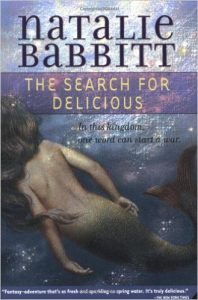Somewhere amid the news of the last two weeks (pretty intense news cycle, I understand) came word that Natalie Babbi tt had died of lung cancer at the age of 84. For someone whose career spanned about 45 years, her output was relatively small: nineteen novels and picture books (as writer) and four picture books as illustrator. Her training was in art, a fact few readers remembered once she had published, in 1976, her most enduring story, Tuck Everlasting. Though overlooked by the Newberys that year, Tuck has migrated into the land of the classics, regularly appearing on Top 100 lists and inspiring two movies and a Broadway musical. Its 40th anniversary last year spawned tributes across the internet, including ours.
tt had died of lung cancer at the age of 84. For someone whose career spanned about 45 years, her output was relatively small: nineteen novels and picture books (as writer) and four picture books as illustrator. Her training was in art, a fact few readers remembered once she had published, in 1976, her most enduring story, Tuck Everlasting. Though overlooked by the Newberys that year, Tuck has migrated into the land of the classics, regularly appearing on Top 100 lists and inspiring two movies and a Broadway musical. Its 40th anniversary last year spawned tributes across the internet, including ours.
I read Tuck to my kids when we were homeschooling, and it won a lasting place in my heart. But almost as much, I loved The Search for Delicious, a gem that has not stood the test of time so well–for this essay, I had to locate a copy through inter-library loan. It’s a fairy-tale that takes place in a small kingdom (see the endpaper map) presided over by a benign king and queen. Though an ordinary kind of place, the kingdom is built upon legends that survive as songs:
Nobody believed [dwarves and mermaids and tree people] were real any more except for an occasional child or an even more occasional worker of evil, these being the only ones with imagination enough to admit to the possibility of something even more amazing in the world than those commonplace marvels which it spreads so carelessly before us every day.
Both child and evil-worker appear in the story, brought into conflict by an ordinary, rather boring project:  the king’s dictionary. Prime Minister DeCree is in charge of writing the dictionary, and all goes swimmingly up until the d’s. Specifically, the definition of “delicious.” To the PM, the epitome of delicious is fried fish. The king objects; obviously, it’s apples. To the queen it’s Christmas pudding, to the army commander it’s something else, and before long fights are breaking out in court. DeCree fears civil war, a prospect so ominous that the king declares a vote must be taken. A messenger will ride from town to town enrolling everyone’s vote, and the food with the most popular appeal will serve as the official definition of delicious. No one seems more suited to the role of messenger than Gaylen, DeCree’s adopted son. A pleasant youth, whose very name means “little healer,” he sets out on the mission with enthusiasm.
the king’s dictionary. Prime Minister DeCree is in charge of writing the dictionary, and all goes swimmingly up until the d’s. Specifically, the definition of “delicious.” To the PM, the epitome of delicious is fried fish. The king objects; obviously, it’s apples. To the queen it’s Christmas pudding, to the army commander it’s something else, and before long fights are breaking out in court. DeCree fears civil war, a prospect so ominous that the king declares a vote must be taken. A messenger will ride from town to town enrolling everyone’s vote, and the food with the most popular appeal will serve as the official definition of delicious. No one seems more suited to the role of messenger than Gaylen, DeCree’s adopted son. A pleasant youth, whose very name means “little healer,” he sets out on the mission with enthusiasm.
Trouble looms at the very first town. The people eagerly line up to record their votes, but before many names are on the record . . . loud arguments, scuffles, and fistfights. Civil unrest grows at the next town, and by now Gaylen realizes that there’s something behind it—or rather, someone. The malevolent Lord Hemlock is using the instability of intolerant opinions to foment rebellion and seize power for himself. That’s not all: Hemlock also intends to use the power of those dwarfs, woldwellers and mermaids that no one believes in anymore. His intentions collide with Gaylen’s as a national crisis unfolds, and Gaylen is tempted to despair: “People are unbearable! They won’t listen, except to lies, and they fight all the time and I have had enough!”
A reader can certainly sympathize. I finished reading, or re-reading, The Search for Delicious on November 10, as conflicting narratives were clashing over the results of an election. Mayhem has ensued, including riots, screams, insults, even fisticuffs. What’s behind it all? Well, it seems people disagree—not only one their definition of “delicious” but also of “evil,” “hateful,” “tolerant,” “acceptable,” and a host of other terms that might or might not relate to public policy. Finding reconciliation in disagreement is democracy’s big project, and always will be. The first place to start, it seems to me, is defining terms (and acknowledging that my “delicious” is not yours). Second, reaching back to history (our “legendary past”) for instruction and examples to follow–or not to follow. Third, finding the key that will open the door to common ground (key & lock have a pivotal role in The Search for Delicious). Fourth, letting go what you can’t have, and strategizing for another day.
That’s the great thing about a good children’s story—actually, it’s the great thing about excellent literature in general. Stories can’t tell us what to do, because they have no such authority. But they can illuminate the path a little.
Support our writers and help keep Redeemed Reader ad-free by joining the Redeemed Reader Fellowship.
Stay Up to Date!
Get the information you need to make wise choices about books for your children and teens.
Our weekly newsletter includes our latest reviews, related links from around the web, a featured book list, book trivia, and more. We never sell your information. You may unsubscribe at any time.
We'd love to hear from you!
Our comments are now limited to our members (both Silver and Golden Key). Members, you just need to log in with your normal log-in credentials!
Not a member yet? You can join the Silver Key ($2.99/month) for a free 2-week trial. Cancel at any time. Find out more about membership here.
1 Comments
Leave a Comment
You must be logged in to post a comment.


Oh, another great author has left us! Natalie Babbitt was so wise, and her books were each small treasures. The Search for Delicious is particularly apropos at the moment.
Thank you for the news, which I would not likely have found out about on my own. And thanks for the review. More people need to know about this wonderful writer.